Creativity Inspired by Antarctica
After a short break and some time to process her experience in Antarctica, we caught up with Inspiring Explorer Ihlara McIndoe to get her perspective on the expedition, and find out about the highlights of her trip, and the big challenges she faced.
About Ihlara
Ihlara is a Music and Law student at Otago University, who is passionate about public policy, women’s empowerment, and Aotearoa’s relationship with its Asia-Pacific neighbours. Ihlara has composed music for orchestras and written film scores. She teaches piano, and started a student-driven initiative, called The Wave, which aims to foster young people’s interest and involvement in classical music. Ihlara is the marketing manager for the New Zealand Women’s Law Journal, and student ambassador for the New Zealand Symphony Orchestra. In 2018, she was the Head Delegate of the Aotearoa Youth Leadership Institute delegation to the United Nations Commission on the Status of Women.
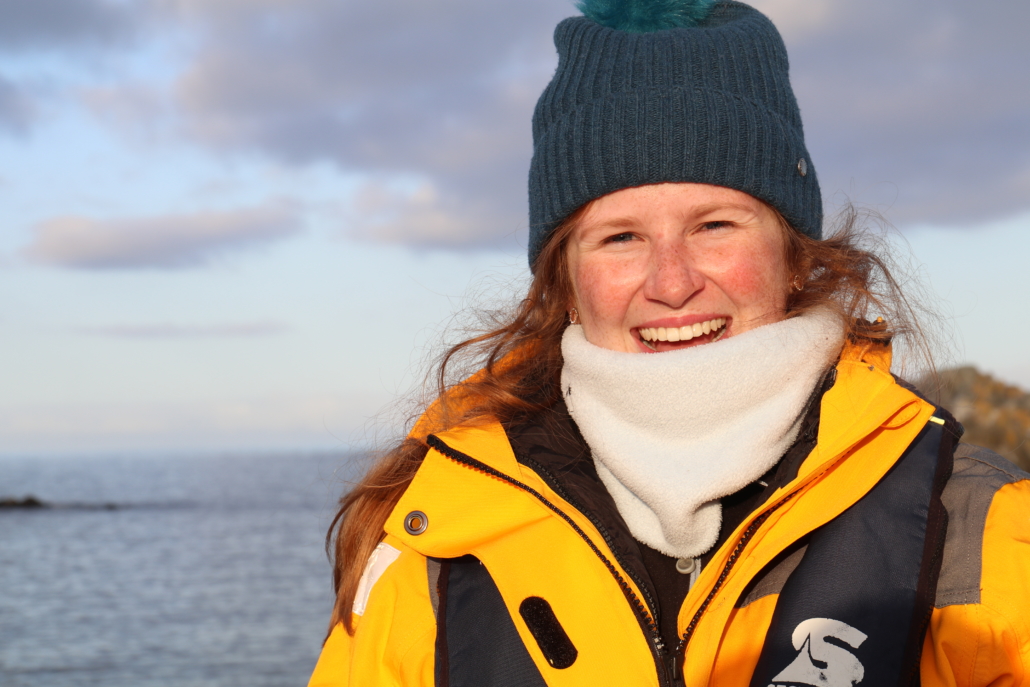 Marcus Waters/Antarctic Heritage Trust
Marcus Waters/Antarctic Heritage Trust Ihlara in Antarctica
What was your favourite part of the trip?
I went to Antarctica to try to find lots of different sounds to use in my composition projects. I had an idea of what sort of sounds I might be hearing but it was incredible to hear so many sounds I didn’t expect. As we kayaked close to icebergs we could hear an overwhelmingly loud crackling sound, as well as the ocean sloshing up against them. Huge cracking sounds of glaciers carving in the distance sent rumblings bouncing off the surrounding bergs, echoing for a long time afterwards. Hearing those sounds was a huge highlight for me and a breathtaking experience.
What was the most challenging part? How did you conquer this?
The journey home across the Drake Passage was pretty rough, with big seas and eight metre swells at times – so that was definitely a challenging time for a number of us! This certainly put a halt on my plans to spend time reflecting on our experience, attending ship lectures, and composing during the travel across the passage. It was a good feeling to finally get back to calmer waters. The other challenge was finding time to do everything I wanted to do, while also taking time to stop and reflect. I wanted to do everything, see everything, hear everything, and be on deck to experience as much as I could – so forcing myself to take a step back was quite a challenge.
What did you learn or discover about yourself?
The important lesson for myself, and I think maybe everyone on the team, was how much we value camaraderie. I learnt a lot from my connection with the rest of the team members about how we can learn about and support each other. Experiences such as helping each other navigate in the kayaks, reflecting together on our experiences, providing each other with assistance for our various projects, and even giving each other space when needed, were things I really valued.
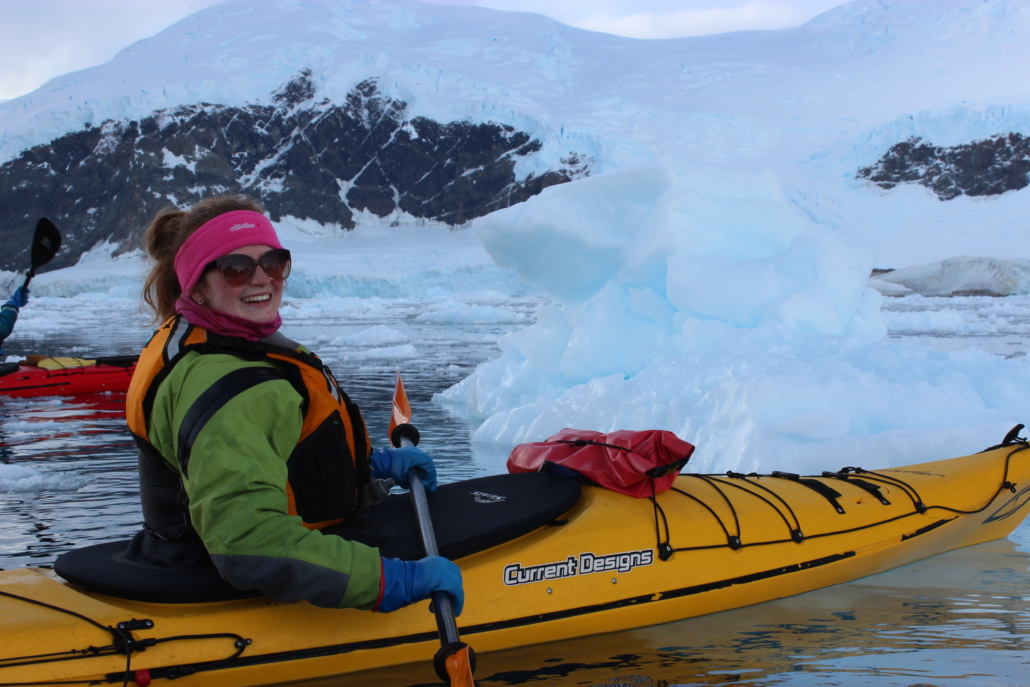 Owain John/Antarctic Heritage Trust
Owain John/Antarctic Heritage Trust Ihlara kayaking
Which sights, sounds, feelings and experiences of Antarctica stand out as you reflect back on your experience?
One experience that really stands out is when we were out on the kayaks and a big piece of ice carved off an iceberg nearby. It made this incredible noise and the force was overwhelming, sending large swells in our direction. The water became calm again, but after a couple of minutes there was a big burst from under the ocean as the ice came up again. For probably the next 10 minutes we experienced moments of stillness interrupted by sudden bursts of this piece of ice tossing and turning in the water, pushed by the ocean currents. It was incredible to witness the immense power of that environment.
How did going to Antarctica make you think about the historic polar explorers? In what way did these reflections impact on your personal experience?
After attending lectures on the ship which looked at the historic explorers, it was interesting to consider how similar yet totally different our experience was to theirs. Of course, we had the same amazing experiences witnessing the enchanting wildlife and stunning landscapes. But it blows my mind thinking of how the historic polar explorers managed to survive in the Antarctic environment. Taking the polar plunge made me reflect on how lucky we were to have a hot shower and hot meal afterwards. It must have been so different for the historic explorers, going out exploring and having these incredible adventures, but not having the security we had to go back to.
What was something you experienced that was different to your expectations?
I didn’t expect to feel quite so small in the Antarctic environment, and I loved it! When we were in our kayaks in the middle of the ocean, I completely lost all sense of direction, of where we were, and where we had come. It was an amazing feeling to be in one small harbour of the Antarctic Peninsula yet to feel so tiny and overwhelmed by the enormity of the space. We would then return to the ship and look at that harbour on the map, and realise how tiny it is in comparison to the whole continent! It’s hard to get my head around.
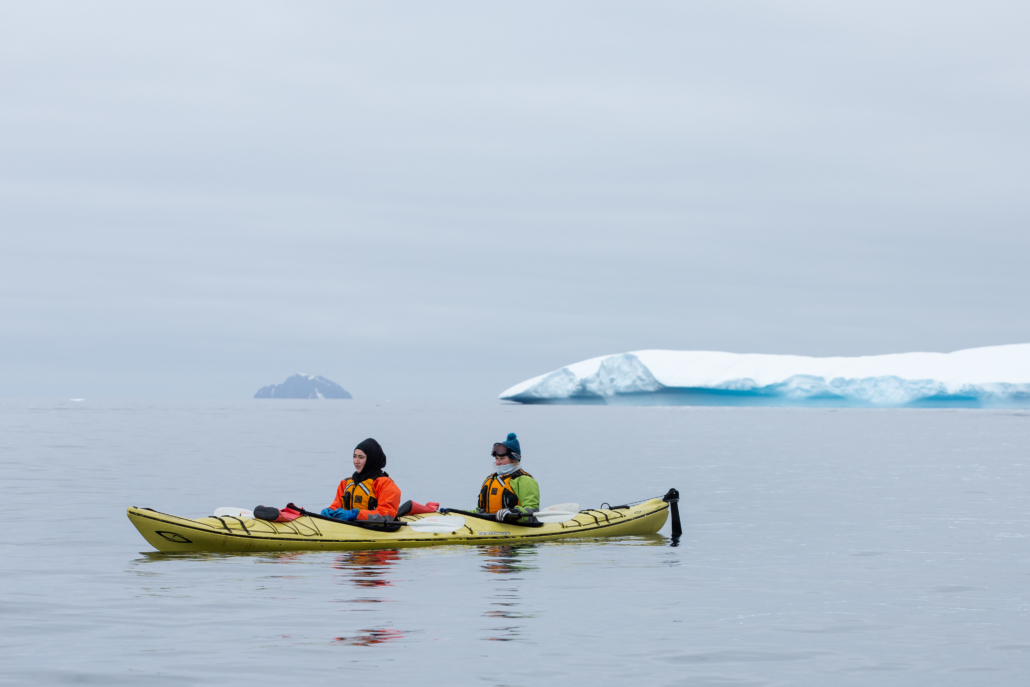 Mike Dawson/Antarctic Heritage Trust
Mike Dawson/Antarctic Heritage Trust Sadra and Ihlara kayaking
When you share your story, what will be the things you want to share most?
From the striking landscapes, to the enchanting wildlife, to the history of the great explorers who have traversed the Antarctic wilderness, the scientific contributions that have arisen here, and the political negotiations which have occurred around this fascinating continent – I am in awe. We have so much to learn about the region and the important role it plays in our everyday lives, which is something I will definitely focus on when I share my story.
What other messages will you be giving to audiences about the trip?
I will definitely be sharing the message of amazing potential for creativity inspired by Antarctica. It was great being on the ship and seeing all these people working on many different artforms – photography, virtual reality, painting and sketching, and of course music. Antarctica is such a beautiful, breathtaking and at times overwhelming, harsh, and severe place. When people ask me how my trip to Antarctica was, I actually find it really difficult to describe in words! But humanity has a long history of saying what can’t be said in words through art. I think there is so much potential to share the magic of Antarctica through artistic platforms, and that’s really exciting.
What skills did you bring to the team, and how were you able to utilise these on the trip?
What I loved about this team was that everyone is from such different backgrounds, so it was fascinating sharing the experience with each other and hearing what each person took away from each day. Being from a music background, I brought a different perspective which I think was valuable. Everyone was aware that I was taking recordings so they were all on the listen-out for interesting sounds. I also wrote the blog posts and interviewed each member of the team for this, so I hope that spending time with each person to consider what they have taken away from their experience was helpful in their reflections.
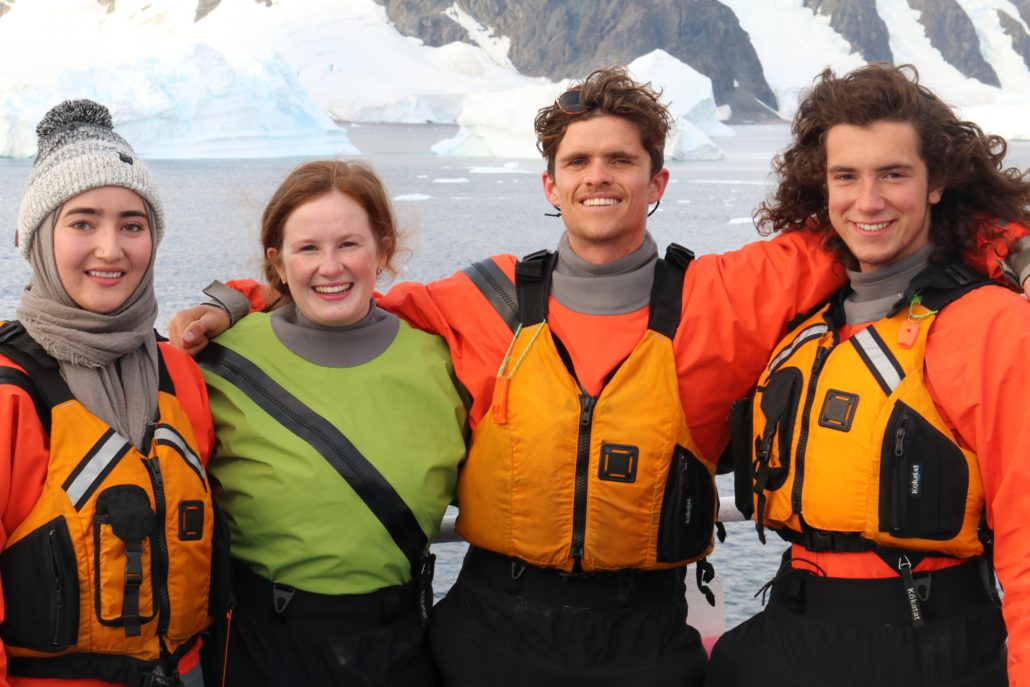 Marcus Waters/Antarctic Heritage Trust
Marcus Waters/Antarctic Heritage Trust Sadra, Ihlara, Owain and Anzac
How did you and the team deal with the disruption to your trip caused by COVID-19? Did this experience make you reflect on the challenges faced by the historic explorers? What similarities do you think there might be?
Obviously, it was a bit of a challenge, but it also added to the adventure! We were lucky in lots of ways. Even though we didn’t really know what was going to happen, we knew the amazing Antarctic Heritage Trust team and Quark Expeditions were working hard to get us home. These experiences definitely made me feel grateful, humbled and very lucky in comparison to how the historic Antarctic explorers must have experienced these sorts of challenges, having to rely solely on themselves.
Any comments about the team itself? What were the strengths of the team? Why do you think it worked well together?
It was a really vibrant and cohesive team made up of people from such different backgrounds with such different interests. I thought it was really cool that A’aifou and Jaylee taught us the haka, and the teamwork during that experience was really great. Some of the team were very patient helping those who were less familiar with the haka. It was a great example of how the team worked together and supported each other while valuing our strengths and weaknesses. The diversity of our group was definitely a strength and I loved learning about all the other explorers’ projects.
Would you recommend others apply for future expeditions and why?
I’d tell anyone to go for it as the expedition is an amazing opportunity. I was a bit nervous going in, because as a musician I didn’t really see my place. But what I would tell people now is that it is an amazing opportunity and having an understanding of the continent is relevant to everybody, whether they have a science, political, exploration and adventure, or arts background. We all have an important role to play in conservation and preservation.
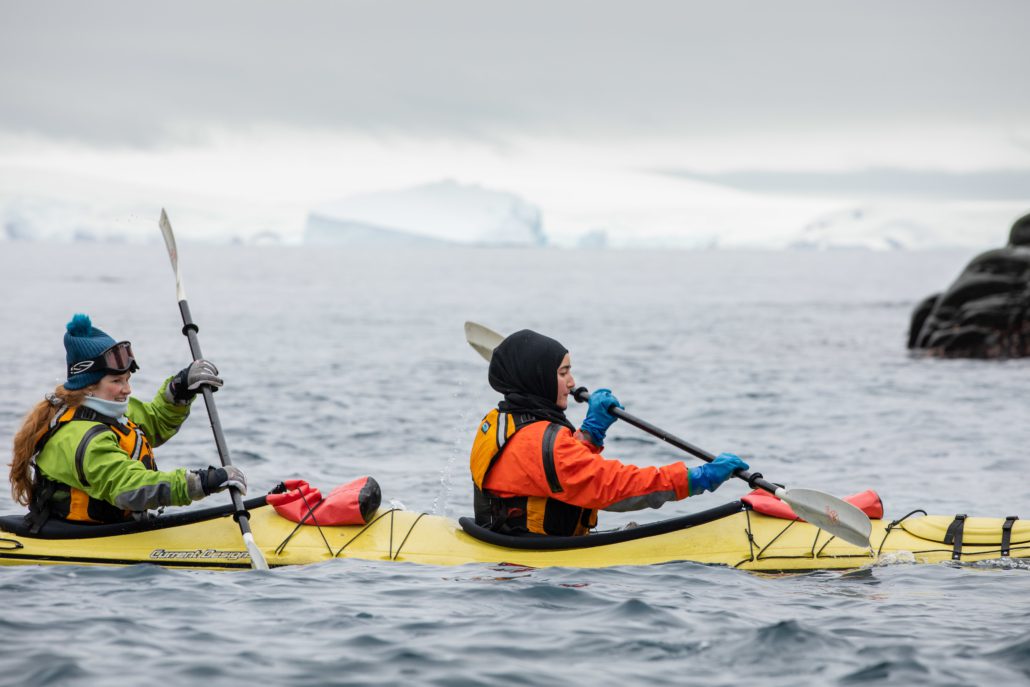 Mike Dawson/Antarctic Heritage Trust
Mike Dawson/Antarctic Heritage Trust Ihlara and Sadra kayaking


